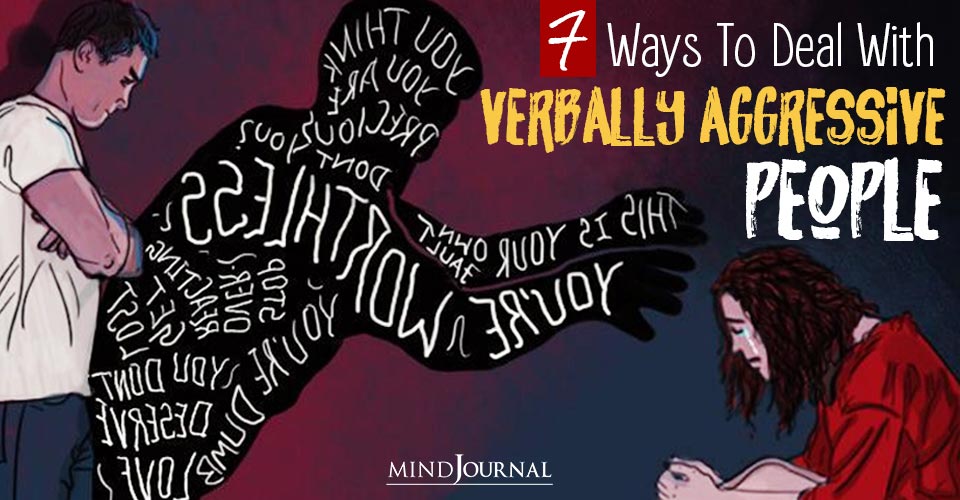Dealing with verbally aggressive people is scary, isn’t it? Being on the other end of verbal aggression is a tough and traumatizing place to be.
Researchers have identified that people who express verbal aggressiveness, do so with the objective of controlling and manipulating others through language. Verbally aggressive people attack the self-concepts of other people rather than, or in addition to, their positions on topics of communication.
Over millions of years of evolution, the human body has learned to react with ‘fight or flight’ in the situation of emergency. Your body automatically goes into this survival mode when you come face to face with an angry person. Feeling defensive is perfectly normal. But there are many more ways in which you can deal with these situations effectively.
Dr. Sanjay describes verbally aggressive people as wild animals with a human tongue. You can also describe these people as adult bullies who have no regard for human life. Verbal aggression, more often than not, shifts into physical abuse which is a very concerning situation.
In a study, it was found that among married couples who faced verbal aggression from their partners 80% were more likely to face instances of physical abuse as well.
If you are facing verbal abuse at your home, at your workplace, or somewhere in public you should and you must not take it. So, how to handle verbal aggression? The following 7 steps will help you in dealing with verbally aggressive people.
Related: The Signs of Verbal Abuse
7 Ways To Deal With Verbally Aggressive People
1. Choose not to respond in kind.
Never respond to an angry person with anger. It will take you nowhere and rather you will be stuck in a situation from which you will not be able to think your way out.
2. Choose not to take it personally.
Remember, that verbally aggressive people might use very hurtful words. But it will be very smart of you if you will consider that the other person is suffering himself and is not able to think clearly about what he/she is speaking. You should choose your response very carefully.

3. Respond with care.
Psychiatric nurses who often face people who get very abusive verbally follow these simple steps, which helps them to prevent the situation from escalating and helps the patient to come back to a state of calm.
Ms. Nora describes the steps as follows:
– Check the aggressive person’s level of aggressiveness on a scale of 1 to 10.
– Attempt to understand the meaning of aggressive behavior.
– Connect with the aggressive person.
– Match a solution intervention to the person’s needs.
You can use these same strategies to attempt to de-escalate an aggressive situation:
– Check their level of aggressiveness. Ask yourself, if based on their actions they are just a little upset or if there is potential for injuries caused to either the angry person or others.
– Don’t wait to call for help if you think someone could get hurt.
– Listen to everything the angry person is saying and rephrase it back to them to make sure you understood them correctly.
– Use language like ‘I understand why you would be upset’ or ‘I can see how that would be frustrating for you.’
– Ask the aggressive person for a suggestion to fix the problem or offer your own solution.
Related: 8 Positive Comebacks To Help Deal With Negative People
4. Allow them a safe place to express their emotions.
What a verbally aggressive person needs is a sink for his/her emotions where they can drain out the negative energy and frustration. Try to listen to them and empathize with your version of reality. Let them know that you are there to help them.
5. Allow them space to be alone.
While in a state of anger, a person becomes very sensitive to the inputs from his surroundings. When there is a lot of stuff to be processed by the brain, it gets confused.
Thus, it is best to let the aggressive person have some alone time. More often, the person realizes what is happening and gets calm.
6. Respond with humor.
This is an edged sword, and if something goes wrong it can really escalate the situation. But a sincere joke always works wonders. It is necessary to keep in mind that the angry person should not be the target of your joke, try to make this at your own expense.
A response like ’And I thought that probably only a knucklehead like me is not able to figure out this problem’ might really help. A smile goes a long way in solving the problem of aggression.
Related: The 7 Types of ‘Quiet’ Verbal Abuse That Are Hard To Notice
7. Suggest resources for help.
When you are on the other side of verbally aggressive behavior, try to offer verbally aggressive people some help, and suggest a doctor or a psychotherapist.
They might initially refuse to take the help, but it is your duty (I must say!) to convince him/her that it is in their own self-interest to seek out help.
Nowadays there is no lack of counseling services as they are available through apps, text lines, websites, and phones, or even through video chats.
Come forward with your experiences and queries. We are happy to help you!
800-799-7233 (SAFE) is the phone number for the National Domestic Violence Hotline and you can also chat through their website if you have questions or need another resource.
Want to know more about dealing with verbally aggressive people? Check this video out below!
The Minds Journal Articles Volume -1 is Copyright Protected vide Regd.# L-103222/2021













Leave a Reply